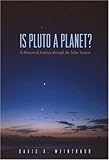Pro-Pluto planet political power push
The planet(oid) Pluto just won’t go away. An Illinois state senate panel has voted to support Pluto’s planetary status. (Pluto was discovered in 1930 by Illinois native Clyde Tombaugh who was then working at the Lowell Observatory in Flagstaff.)
Plutonian planetary proponents posted previously to my post (and the latest report) about the process and scientific errors in the 2006 vote. Among other things, only 424 astronomers of 2,700 attending (and 10,000 members) voted on this measure. In addition to the earlier anti-Pluto book by astrophysicist (not planetary physicist) Neil DeGrasse Tyson, there is also pro-Pluto (but more balanced) book by David A. Weintraub, Is Pluto a Planet? Dr. Weintraub’s expertise includes “planet formation,” which means he’s more qualified to weigh in than someone (for example) who studies black holes or binary stars.
In addition to the earlier anti-Pluto book by astrophysicist (not planetary physicist) Neil DeGrasse Tyson, there is also pro-Pluto (but more balanced) book by David A. Weintraub, Is Pluto a Planet? Dr. Weintraub’s expertise includes “planet formation,” which means he’s more qualified to weigh in than someone (for example) who studies black holes or binary stars.
The Facebook group “When I was your age, Pluto was a planet” has gained 58,000 members in the month since I joined it, now holding 1,605,274 members. But still the Pluto injustice continues!

![[feed]](http://photos1.blogger.com/x/blogger2/6971/993546936938810/1600/z/962294/gse_multipart3851.gif)

1 comment:
The Pluto issue won't go away because the IAU definition is just plain wrong.
Pluto IS a planet because unlike most objects in the Kuiper Belt, it has attained hydrostatic equilibrium, meaning it has enough self-gravity to have pulled itself into a round shape. This characteristic of being spherical and shaped by gravity rather than chemical bonds is a feature of planets and not of shapeless asteroids and comets. Not distinguishing between asteroids and objects whose composition clearly makes them planets is a disservice and is sloppy science.
As of now, there are three other KBOs that meet this criterion and therefore should be classified as planets—Haumea, Makemake, and Eris. Only one KBO has been found to be larger than Pluto, and that is Eris.
The IAU definition makes no linguistic sense, as it states that dwarf planets are not planets at all. That’s like saying a grizzly bear is not a bear. Second, it defines objects solely by where they are while ignoring what they are. If Earth were placed in Pluto’s orbit, by the IAU definition, it would not be a planet. That is because the further away an object is from its parent star, the more difficulty it will have in clearing its orbit.
Significantly, this definition was adopted by only four percent of the IAU, most of whom are not planetary scientists. No absentee voting was allowed. It was done so in a highly controversial process that violated the IAU’s own bylaws, and it was immediately opposed by a petition of 300 professional astronomers saying they will not use the new definition, which they described accurately as “sloppy.” Also significant is the fact that many planetary scientists are not IAU members and therefore had no say in this matter at all.
Many believe we should keep the term planet broad to encompass any non-self-luminous spheroidal object orbiting a star. We can distinguish different types of planets with subcategories such as terrestrial planets, gas giants, ice giants, dwarf planets, super Earths, hot Jupiters, etc.
We should be broadening, not narrowing our concept of planet as more objects are being discovered in this and other solar systems.
In a 2000 paper, Dr. Alan Stern and Dr. Hal Levison distinguish two types of planets—the gravitationally dominant ones and the smaller ones that are not gravitationally dominant. However, they never say that objects in the latter category are not planets.
I attended the Great Planet Debate, which actually took place in August 2008, and there was a strong consensus there that a broader, more encompassing planet definition is needed. I encourage anyone interested to listen to and view the conference proceedings at http://gpd.jhuapl.edu/ You can also read more about this issue on my blog at http://laurele.livejournal.com
You can find the petition of astronomers who rejected the demotion of Pluto here: http://www.ipetitions.com/petition/planetprotest/
Even now, there are both scientists and lay people working to overturn the demotion and others just simply ignoring it. This debate is far from over.
Post a Comment